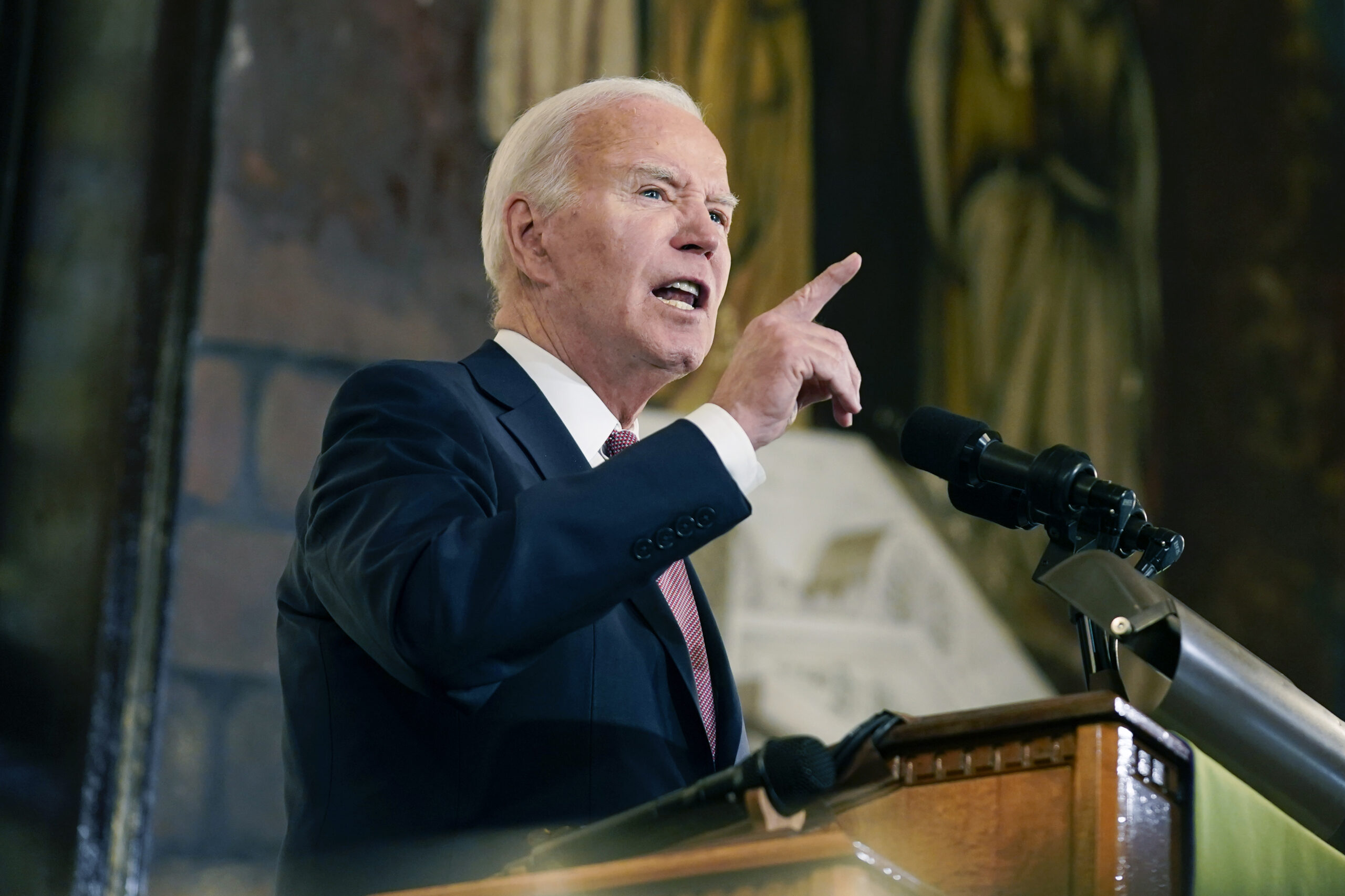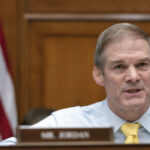

A left-wing organization accused of potentially violating antitrust law is quietly influencing the Biden administration’s push to enact expansive green energy policies, records show.
Ceres, a Boston-based environmental charity accepting large checks from undisclosed sources, says it works through “powerful networks and global collaborations of investors, companies, and nonprofits,” to support federal rules taking aim at the fossil fuels industry. That nonprofit group, which faced a subpoena in June from the House Judiciary Committee over whether it unlawfully facilitated collusion with major corporations, has spent more than $1 million on lobbying in recent years, all while working to shape a new climate disclosure proposal that energy groups argue is unpopular and a free-market overreach, according to documents reviewed by the Washington Examiner.
The ties between Ceres and the government underscore how the Biden administration relies on liberal activist hubs to work on passing unprecedented laws that, in the eyes of Republicans and conservative groups, could lead to national security risks due to the potential that their implementation could lead to a widespread crackdown on appliances reliant on oil and gas. President Joe Biden launched the National Climate Task Force in 2021, and his administration has set aside billions of dollars for green energy initiatives, as well as put forth fossil-fuel restrictions that energy experts have equated to unjust power grabs.
Ceres, which was founded in 1989, notably manages a network with more than 220 institutional investors claiming to handle more than $46 trillion in assets to “accelerate the transition to a just, sustainable, net-zero emissions economy,” tax filings show. Ceres reported on its most recent tax filing, which covers the period between November 2021 and October 2022, that the group raised $26.5 million, with two anonymous grantees apparently providing 35% of that sum. The charity has also taken millions of dollars in recent years from New Venture Fund, a nonprofit organization managed by Arabella Advisors, the largest Democratic-allied dark money network in the United States. Arabella Advisors and its offshoots are under investigation by the Washington, D.C., attorney general over reported financial mismanagement allegations.
Members in the Ceres investor network, which includes investment firms such as Bain Capital and BlackRock as well as public pension funds and foundations, have sought to “pressure stock exchanges and capital market regulators to improve climate and sustainability risk disclosure, and opportunities to advocate for stronger climate, clean energy and water policies at all levels of government,” according to an archived version of the Ceres website.
At the same time, Ceres has deployed its lobbyists to Washington to convince Congress, the Executive Office of the President, and agencies to support electric vehicle tax incentives, electric vehicle adoption, emissions reductions, and certain climate-related amendments in appropriations bills, among other matters, according to federal lobbying documents filed with the Senate and OpenSecrets, a nonpartisan research group.
And Ceres President Mindy Lubber notably has scored six visits to the White House since 2021, records show.
“One of the most sinister aspects of the Biden administration is their policy of allowing extreme environmental personnel and policies free rein to attack American energy through official actions,” spokesman Larry Behrens for the right-leaning Power the Future energy advocacy group told the Washington Examiner.
‘Special Access’
Ceres came under the spotlight last year when House Judiciary Committee Chairman Jim Jordan (R-OH) issued a subpoena to the group to uncover documents on its efforts to advance corporate environmental, social, and governance efforts. Conservatives have increasingly taken aim at ESG, which refers to a framework encouraging companies to prioritize social matters in connection to investing and business operations — holding that ESG aims to reshape the U.S. in a “woke” and far-left fashion.
Steven Rothstein, managing director for the Ceres Accelerator for Sustainable Capital Markets program, told the Washington Examiner in an interview that Ceres is in full compliance with the subpoena and law, stating, “We believe fully in the free market.”
House Judiciary Committee spokeswoman Nadgey Louis-Charles told the Washington Examiner that Ceres has failed to produce many responsive documents, noting that the GOP-led panel “is aggressively examining the progressive ESG movement and has received volumes of documents in response to our subpoenas to left-wing environmental activists and major players in the U.S. investment industry.”
The congressional subpoena focused on Jordan’s antitrust law concerns stemming from how Ceres helps lead Climate Action 100+, “an investor-led initiative to ensure the world’s largest corporate greenhouse gas emitters take necessary action on climate change,” which is responsible for $68 trillion in assets, according to the Climate Action 100+ website. The initiative was launched with initial funding from the Sea Change Foundation, a left-wing nonprofit group in San Francisco that congressional Republicans have investigated for allegedly serving as a “conduit for Russian funding,” though Sea Change has denied these allegations.
Now, Ceres is advocating a Securities and Exchange Commission rule proposed in March 2022 that would require public companies to disclose their greenhouse gas emissions. Free-market advocacy groups say it could lay the groundwork for the government to then set arbitrary standards limiting companies’ abilities to function.
According to the Western Energy Alliance trade association, 81% of asset managers cited by the SEC as supporting the proposed rule are foreign, and just 7% of U.S.-based asset managers support it. Republicans on the House Financial Services Committee notably grilled SEC Chairman Gary Gensler in a hearing late last year on the proposal because the regulator did not provide information after prior requests from lawmakers.
‘Deeply Concerned’
The proposed SEC rule, which Western Energy Alliance President Kathleen Sgamma told the Washington Examiner is “unworkable” and would amount to “compelled speech” if implemented, cited Ceres and Climate Action 100+ almost 40 times combined, documents show. Then-SEC Commissioner Allison Herren Lee, a Democrat, also cited Ceres and Climate Action 100+ in a March 2022 statement on the proposed rule, which she dubbed “a watershed moment for investors and financial markets,” according to SEC records.
SEC records list at least 20 meetings between Ceres personnel and the agency to discuss the proposed rule, which Ceres President Mindy Lubber, a Democratic donor, claimed in a September 2022 Reuters op-ed would “protect investors by providing the information they are requesting to maintain fair, orderly, and efficient markets and to facilitate capital formation.”
Lubber directed a $250 donation last January to the campaign for Sen. Sheldon Whitehouse (D-RI), who has worked on climate matters alongside Ceres and who pressured Gensler to approve the disclosure proposal rule, which would have to be supported by three out of the five SEC commissioners to pass. She has given in the past to campaigns for Sens. Elizabeth Warren (D-MA), Ed Markey (D-MA), and other climate hawk politicians, according to Federal Election Commission records.
Rothstein told the Washington Examiner he gives the SEC credit for “hearing from all sides” in connection to the climate disclosure proposal, noting the regulator has received more than 16,000 comments and, for instance, met with the U.S. Chamber of Commerce, which released an October 2023 statement noting it is “deeply concerned” with the proposal.
But an important factor to look at as far as Ceres and its influence lies in various unearthed communications between the group and the SEC, according to watchdogs.
Internal documents reviewed by the Washington Examiner, which were first obtained by Energy Policy Advocates, show Ceres staffer Jim Coburn emailed ClimateWorks Foundation fellow Curtis D. Ravenel in 2021 to key him in on how Coburn was “trying to help” SEC Climate Policy Counsel Mike Morse on matters as Ceres was “very focused on an SEC climate disclosure rule.”
Further emails shared with the Washington Examiner and obtained by the Government Accountability and Oversight watchdog show Morse was told on May 12, 2022, by then-chief sustainability officer Tim Mohim of Persefoni, a climate software developer firm, that a cost-benefit analysis study commissioned by Ceres and Persefoni on climate disclosure activities “confirms the SEC estimates.”
The email shows the SEC apparently was given advance notice of critical proposal-related details before the Ceres-Persefoni study was released just five days later, on May 17, 2022, said Chris Horner, a lawyer for both Energy Policy Advocates and Government Accountability and Oversight.
“Here again we see just how closely activists and rent-seeking business interests worked with the SEC in developing its ‘climate risk disclosure’ agenda,” Horner told the Washington Examiner, pointing to communications reported on by Fox News showing how then-SEC senior counsel Kristina Wyatt, who is now working for Persefoni, coordinated to craft the proposal with the firm, which could financially benefit from its passage.
To Power the Future’s Behrens, the level of access the government is providing activists to the halls of power is resulting in an “avalanche of rules, regulations, and standards that aim to disrupt every part of American life.”
Rothstein denied in an interview with the Washington Examiner that the group has any “special access,” while Zach Friedman, the Ceres director for its federal policy team, said, “We are completely behind the policy environment that’s created this certainty for investors and companies to drive this private sector, clean energy investment boon that is creating jobs.”
Rothstein noted that he applauds the SEC for “the thoroughness of their diligence” when it comes to the proposal. The SEC will finalize it this spring.
CLICK HERE TO READ MORE FROM THE WASHINGTON EXAMINER
“Using their access, these groups then rebrand their efforts through the Biden bureaucracy all while pretending their small, well-funded actions represent a large coalition,” Behrens said.
The SEC did not return a request for comment.







